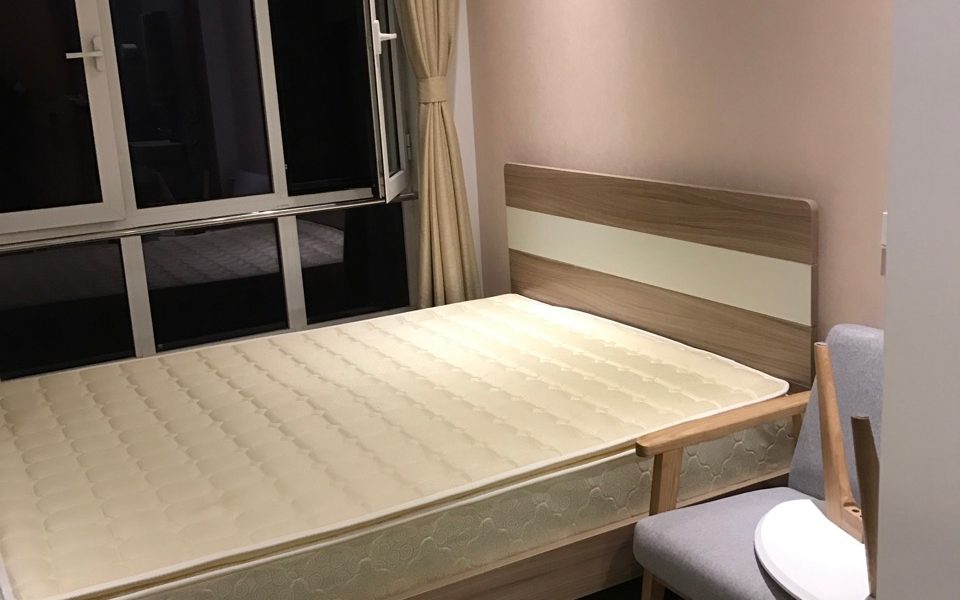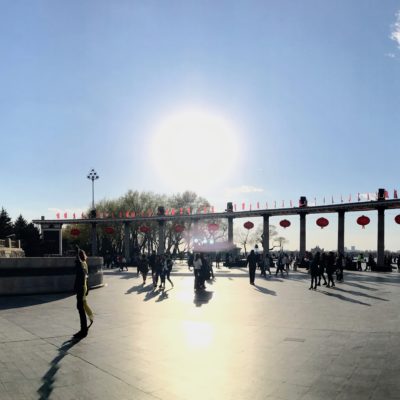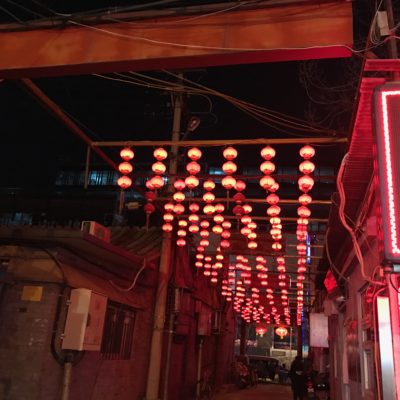Oct. 25, 2016
11:30 pm
Beijing, China
So guess what guys! I put down a deposit on an apartment today! I know, super exciting, right?! Okay, maybe not for you guys, but it is for me. It’s nerve wracking to be living in a hotel with an eviction date looming over my head and not knowing where I’m going. So the answers to some of your questions (or at least the ones my parents asked):
-No, I’m not living with Taylor. We never officially said, “yes, we’re definitely living together.” We were both looking at single places closer to our respective offices. And I did check with her to make sure that she was okay with me getting the place.
-It’s really close to my work. I only have to take a short bus ride.
-It’s a studio, so it’s not super big, but it’s really nice.
-It’s furnished, but in a Chinese way. AKA, no stove, oven, or dishwasher, but a washing machine, mini fridge, and TV.
-It’s almost 1,000元 cheaper than what I planned for, even with utilities factored in.
-I have the added bonus of a gym, dance studio, game room, and kitchen available at no extra charge in the basement of the building I’m in.
I want to dedicate this post to apartment hunting in Beijing. I came here with no real understanding of what was expected. A rough idea, but nothing concrete. So, for anyone looking to move to Beijing, PAY ATTENTION!!!!
When you are looking for an apartment in Beijing, you need to be aware of a lot of variables.
1. Which ring you are looking in. Beijing has 5 rings, going from the center of the city outward. As you can imagine, an apartment inside the first ring is going to be much more expensive than an apartment in the fifth ring. My apartment isn’t even witching the city rings, which is why it was so inexpensive for me.
2. Which subway stop is closest to your work. The subway in Beijing is extremely crowded, especially around 7:30-9 in the morning and 4:30-6:30 in the evening — rush hour. It’s like a can of sardines in there sometimes. You don’t have to hold on because you can’t move anyway. That being said, there are other times when it’s deserted. Anyway, it’s a good idea to find an apartment near the same subway line as your work or with maybe one line change. Just be aware that it may take longer than you expect to switch trains.
3. How much you’re willing to spend. Be really clear about your budget. You can find stuff in your price range, but you may have to look farther away.
4. What you want. In Chinese culture, you don’t beat around the bush. If you say, “Well, I guess this might be okay,” Chinese people will assume you actually mean that it’s okay. If you don’t like something, tell them. Be direct and confident. Everything in China is negotiable. I probably could have done a little better when I got my apartment, but it was already pretty great and a really good deal.
So when you first go to look for an apartment you need to find an agent. Talk to people at work to find out who they used and recommend and which area they live in. This will give you agent contacts and may give you an idea of where to look for your new home. My center director helped me find this apartment, where three other teachers live. There are also a lot of agencies around. There’s one agency that has a green sign called Lian Jia (链家). They’re everywhere and most have at least one agent who speaks English. They have good apartments and are helpful. Be careful of some freelance agents, because they might try to take advantage of you. Still use them, of course, just make sure everything you negotiate is in the contract. Also, ask for pictures before you go. If you don’t like what you see, don’t bother going. Just tell them no. Again, if you read my last blog, don’t always trust the pictures. The apartment is rarely better and sometimes much worse.
Now we’re going to talk about something that is taboo in the U.S.: money. You’re first down payment on an apartment here is going to be HUGE! If you’re expecting to spend 4000元 (600 USD) per month on an apartment (like I was), come with 3,000 USD in your bank account. For your first down payment, you will pay about 5 months rent. In China, most landlords have you pay quarterly, so you pay 3 months at a time. Additionally, you’re deposit is one month’s rent. I was able to negotiate so that my deposit to hold the apartment was only 1000元, but I will still have to pay the total 5 months to get my apartment. The final month is for the the agency fee. Agents here get paid on commission. So feel free to use 20 different agents to find apartments. They can’t charge you any money for going to see apartments. The only time you pay is if you rent one of the apartments they showed you. And it’s not uncommon for them to charge you another quarter of the rent. Even if you don’t use an agent (like my CD coming to help me talk to the landlord instead of an agent), you still have to pay the agency fee. So if you are planning to spend 4000元 a month, you’re expected to pay around 20,000元 upfront.
Now I’m really lucky. My work offered us a 10,000元 advance to help us pay for our apartments, so I only have to pay about $650 out of pocket, plus $30 for utilities each month (yeah, that’s water, electric, wifi, and cable). That said, I came with $2000 in my bank account. Money from the states can be difficult to get here. Most stores don’t accept cards, only cash or WeChatPay or AlyPay (basically Apple or Samsung Pay that uses an app to hook up to your bank account and you pay with your phone). WeChatPay is what I use. It gives a QR code the store can scan. It’s actually how I paid my deposit. This means you really can’t use international (or even local) cards to buy stuff. So, how do you get you’re money from the states into China? There are a few options.
1. Wire transfer: This is extremely expensive and the option I would strongly discourage. Plus, the U.S. bank requires a lot of information that banks in China really don’t have, like routing numbers. You will pay a large fee to both the American and Chinese bank.
2. A regular U.S. check: I’m not sure if this works because I haven’t tried. I didn’t bring my checkbook to China. That said, my US bank thinks it would probably work.
3. Withdrawing from an ATM: This can also be expensive, but the fees are not nearly as bad as the wire transfer. And for some banks, they have a partner here, so if you can find that partner’s ATM, I don’t think you have to pay ATM fees (but you will still probably have to pay exchange fees). You will simply withdraw cash (most limits are 20,000元 a day) and then take it to the bank and deposit it in your Chinese account. I have yet to see an ATM that will let you deposit cash there. This is the method I will be using.
4. Bring enough cash with you: This may the easiest and cheapest, but not necessarily the safest. If you don’t mind the risk of carrying a lot of cash, get enough Chinese cash to cover expensives until you begin earning a paycheck before you leave the states.
After you rent an apartment, there’s still a lot of red tape you have to go through. I don’t know much about this, because I haven’t done it yet, but I’ll give you a brief overview.
1. Sign your lease/contract.
2. Get your landlord’s information: copy of ID, name, etc.
3. Get your Fapiao. This is not necessary, but our business collects them and then they get exempted from taxes. This usually costs you like 5% of what you just paid, but I think it’s worth it.
4. Register at the local police station within 24 hours. You have to do this or you get fined for each day you don’t. Take your landlord and maybe your agent (to translate) with you. Take your ID, the lease, and your landlord’s ID with you.
That’s about all I know about that. I’ll write another blog on it in a week.
Anyway, sorry for the long post, but I thought this was important to share. If you are moving to Beijing and want to know more, please just send me a message on my Contact Me page or leave a comment. If you found this post interesting or boring or whatever, please also feel free to leave feedback.
I’m going to be bad and not leave a challenge tonight because it’s already 12:30am here. Maybe I’ll do a quick status update on FB tomorrow morning.
Goodnight, all!
Bless,
Kristen





Cathy Fagg
Looks great, Kristen! I’m excited you found a place!
Jaime B
You’re doing such a beautiful job, Kristen. You’re blog is a joy to read and I’m grateful for the opportunity to share this with you. Thank you for taking the time each day to detail your adventure. Soak it all in – I’m certain you will. Trust your voice – there’s beauty in what you speak. Wishing you well!
Kristen McKell
Thanks, Jamie, I’m glad you’re enjoying it. I hope I don’t get too boring later on 😉